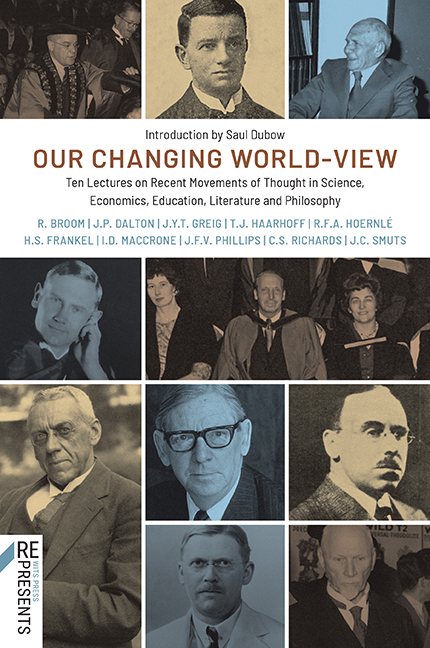 Our Changing World-View
Our Changing World-View Book contents
- Frontmatter
- Contents
- Introduction
- Preface
- Miscellaneous Frontmatter
- 1 Some Recent Scientific Advances in Their Bearing on Philosophy
- 2 The Material World—Yesterday and Today
- 3 Evolution—Design or Accident?
- 4 Man at the Crossroads
- 5 Psychology in Perspective
- 6 Literature in the Machine Age
- 7 The Holistic Attitude in Education
- 8 Our Changing Economic World
- 9 Africa in the Re-Making
- 10 Old Truths and New Discoveries
5 - Psychology in Perspective
Published online by Cambridge University Press: 12 October 2021
- Frontmatter
- Contents
- Introduction
- Preface
- Miscellaneous Frontmatter
- 1 Some Recent Scientific Advances in Their Bearing on Philosophy
- 2 The Material World—Yesterday and Today
- 3 Evolution—Design or Accident?
- 4 Man at the Crossroads
- 5 Psychology in Perspective
- 6 Literature in the Machine Age
- 7 The Holistic Attitude in Education
- 8 Our Changing Economic World
- 9 Africa in the Re-Making
- 10 Old Truths and New Discoveries
Summary
—The Background.
THE aim of this lecture is to give an account of contemporary psychology so that it may be seen in its proper perspective. Certain recent developments in psychology have excited so much widespread interest that there is a real danger of overlooking the wood for some of the trees; and it is in order to supply a corrective to this rather unfortunate tendency that I wish, first of all, to fill in some of the background without which contemporary psychology, its aims, achievements and problems, cannot be properly appreciated. Psychology in one sense is very old, for it can claim, in common with several other intellectual disciplines, Aristotle as its original founder; in another sense, however, it is very young, for as an independent scientific study relying upon experimental method it goes back no further than about the middle of the last century. For that reason it has been said that psychology “has a long past but a short history,” and fortunately for us we are only concerned with the history. By common consent the name of Wundt (1832-1920) is pre-eminent in that history, for it was he who, more than any other single individual, founded modern psychology as an independent experimental science and whose influence dominated it up to the close of the 19th century. Contemporary psychology, it is true, has completely overflowed and even obliterated the lines laid down by the Wundtian or “classical” psychology of the last century, but its significance can only be fully understood if we bear in mind the main source from which it derives.
Briefly put, the achievement of Wundt consisted in establishing psychology as an experimental science upon its own feet. Before that time the experimental investigation of psychological and near-psychological problems had been in the hands of physicists and more particularly physiologists. Men like Weber and Fechner, Helmholtz and Hering, Wundt's immediate predecessors and contemporaries, were by training and profession physicists and physiologists who had become interested in psychophysical and psychophysiological problems with which they dealt by means of the experimental techniques already established in physics and in physiology.
- Type
- Chapter
- Information
- Our Changing World-ViewTen Lectures on Recent Movements of Thought in Science, Economics, Education, Literature and Philosophy, pp. 101 - 126Publisher: Wits University PressPrint publication year: 2021
